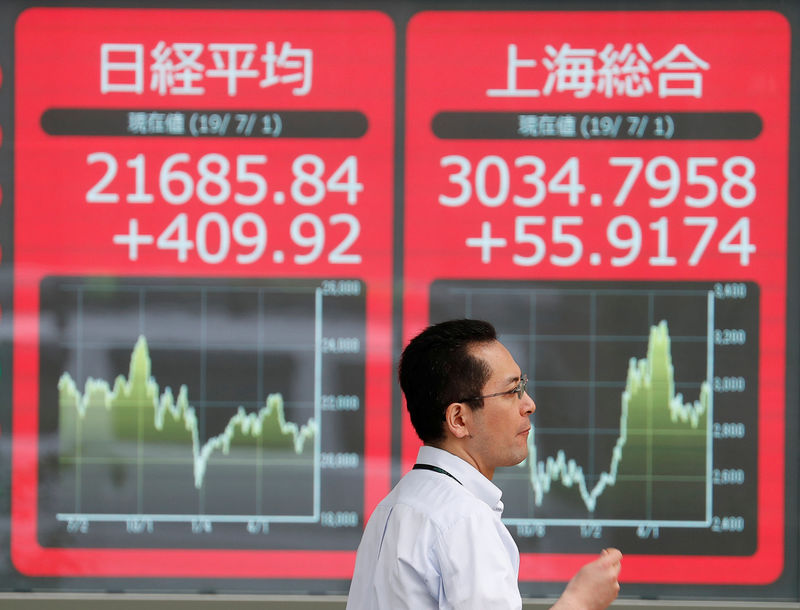This post was originally published on this site
https://i-invdn-com.akamaized.net/trkd-images/LYNXMPEFAC01L_L.jpg
By Stanley White
TOKYO (Reuters) – Asian stocks and Wall Street futures fell on Wednesday on growing worries U.S.-China trade talks are stalling after President Donald Trump failed to deliver any new information about when the two countries would sign a trade deal.
MSCI’s broadest index of Asia-Pacific shares outside Japan () fell 0.2%. Australian shares () were down 0.17%, while Japan’s Nikkei stock index () slid 0.38%.
The dollar drifted in Asia after Trump said a trade deal was “close” but gave no new details on when or where an agreement would be signed, disappointing investors in what was billed as a major speech on his administration’s economic policies.
Trump also rattled some investors by threatening China with even more tariffs if they do not sign a deal.
Oil prices fell as diminishing prospects for an immediate resolution to a 16-month long trade war between the world’s two-largest economies suggested less demand for energy in the future.
Expectations for a “phase one” trade deal some time this month have been a key factor supporting stocks and riskier assets recently. However, the lack of material progress on an agreement has only increased doubts about whether a trade deal will take place at all.
“I’m absolutely concerned. The clock is ticking,” said Michael McCarthy, chief market strategist at CMC Markets in Sydney.
“Markets are now expecting substantial progress in the next week or so, and if not then confidence could crumble. There are diverging interpretations of Trump’s comments. I tend to go with commodities like oil and because they are plugged in to global demand, so their fall is significant.”
U.S. stock futures () fell 0.14% in Asia after the S&P 500 () eked out a 0.16% gain on Tuesday. The S&P 500 and Nasdaq hit all-time highs during trading on Tuesday but stocks ended off session highs after Trump’s speech.
Washington and Beijing have imposed tariffs on each other’s goods in a bitter dispute over Chinese trade practices that the Trump administration says are unfair.
The standoff has roiled global financial markets and raised the risk of recession for some economies as global trade slows.
In recent weeks, both sides have indicated they were making progress toward an agreement that would potentially scale back some tariffs, but a lack of additional information is starting to unsettle some investors in equities and other riskier assets.
In a reminder of the potential for further friction, Trump said on Tuesday he would raise tariffs on Chinese goods “very substantially” if China does not agree a deal. “And that’s going to be true for other countries that mistreat us too,” he added.
In currencies, the dollar was just a shade lower at 108.99 yen , pulling away slightly from a five-month high reached no Nov. 7.
The yield on benchmark 10-year Treasury notes () rose slightly to 1.9277% but is likely to move in a narrow range before data due later Wednesday that is forecast to show U.S. consumer prices accelerated slightly in October.
U.S. crude () dipped 0.25% to $56.66 a barrel do to worries about weakening demand for oil.
LME copper traded down 0.4% at $5,854 a tonne by 2337 GMT, having earlier reached the weakest since Nov. 1 at $5,842 a tonne. Copper, widely used in power and construction, is seen as a gauge of economic health.
In addition, China accounts for about half of the world’s demand for copper, and many other metals.
Graphic: Asian stock markets (https://product.datastream.com/dscharting/gateway.aspx?guid=516bc8cb-b44e-4346-bce3-06590d8e396b&action=REFRESH)

